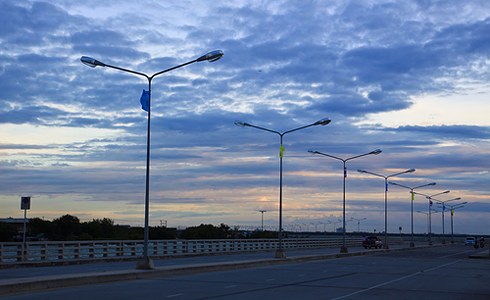Michael Bruch: One reason is insufficient incentives to invest in reliable power supply infrastructures. As a consequence the grid stability will substantially decrease. We're still operating with a power grid designed in the last century to distribute electricity from central power plants to the customers.
Power blackouts pose a growing challenge
Why might we experience more power blackouts in future?
Today the grid has to cope with new challenges. Renewable energies such as solar and wind are having an more and more of a negative impact because their availability fluctuates considerably. Also, as more and more grids are interconnected, a blackout in one region can trigger a domino effect. Aging infrastructure only makes that situation more critical.

What are the triggers for blackouts?
Bruch: Blackouts can originate from a number of causes, often combined. Most common is a surge in demand, for instance due to heat waves boosting air conditioner use. Then there are transmission failures caused by aging infrastructure as already mentioned.
And we all know how events such as floods and earthquakes can lead to failures at production sites. Those failures can also have man-made causes like construction defects or operating errors. Even solar storms have been known to cause fluctuations in grids and electronic infrastructure, for instance destroying transformers.

The risk of longer lasting, larger scale blackouts may increase in the future and severely affect private homes and businesses alike
What are the consequences of large-scale blackouts?
Markus Aichinger: Long-lasting power failures would have a significant impact on our daily life and the entire economy. Just imagine: critical infrastructure such as communication and transport would be hit, the heating and water supply would stop and production and commerce would come to a halt.
You couldn't even call emergency numbers, and hospitals would only be able to work as long as there's fuel for the emergency power generator to work. Cash machines would simply stop working, and shops would close. And higher-end financial trading would totally shut down.

In what respect are companies affected?
Bruch: Even shorter blackouts mean high economic losses for companies. A blackout in financial trading could cause a loss of about 6 million euros per hour, and in telecommunications it would be 30,000 euros per minute. To mitigate losses, companies should prepare better first and foremost by assessing their preparedness for blackout events, their own vulnerability and that of their critical suppliers. Such scenarios should be reviewed and tested within a properly managed business continuity plan.
What kind of solutions have insurers has provided so far and what else could they offer?
Bruch: The insurance industry has so far provided coverage only in case of physical damage to assets that causes business interruption, meaning only in some 20-25 percent of all cases. However, blackouts might typically lead to business and supply chain interruptions without physical loss. This demands new risk transfer solutions. Covering non-physical business interruption is unknown territory for most insurers.
But in response to these new risks, Allianz corporate specialists are developing highly customized solutions to support multinational clients.
What can utilities and governments do?
Aichinger: Governments have to establish a clear framework for the governance of power supply infrastructures. This is a necessary step to enhance resilience of power grids against blackout events. But it is the public and private utility operators who have to ensure reliable power supplies. Operational risk management and a good quality business continuity plan can help mitigate the risk. The real message is: be prepared!
As with all content published on this site, these statements are subject to our Forward Looking Statement disclaimer.
Link to the disclaimer